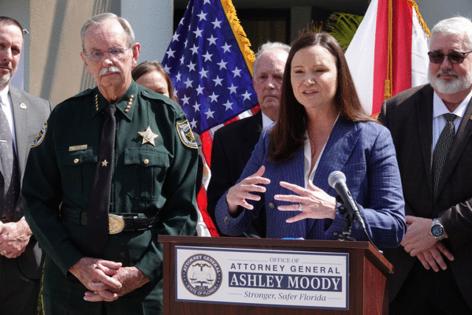'I will get justice': How a deck of cards may help solve South Florida cold cases
Published in News & Features
FORT LAUDERDALE, Fla. — The king of diamonds shows the face of a young man shot and killed in Sunrise just hours before his 21st birthday. On the four of diamonds is the rendering of a woman whose remains were found in Palm Beach County in 1980, whose name is still unknown. The queen of spades tells the story of a woman whose sister said she still believes that it is only a matter of time until those responsible for her murder nearly two decades ago are caught.
Five people from South Florida whose cases remain unsolved are included in a newly revived initiative from Attorney General Ashley Moody’s office that aims to use decks of playing cards to generate tips from those who are holding them — people incarcerated in county jails and prisons throughout Florida.
More than 5,000 decks of playing cards with photos of 52 men and women and facts of their cases are being rolled out in 60 county jails and 145 Florida Department of Corrections facilities. Moody, at a recent news conference along with the Florida Sheriff’s Association, the Florida Association of Crime Stoppers and the Florida Department of Corrections, said they started distributing the cards in early June.
In Florida alone, there are more than 20,000 unsolved murders, according to Moody’s office. The Office of Statewide Prosecution launched a new Cold Case Investigations Unit earlier this year, and the office is investigating some of the cases included in the cards.
South Florida in recent years has seen breakthroughs in multiple cold cases as DNA testing methods have continued to advance over the years. Suspects’ names have been revealed in multiple cases where authorities have worked with Othram, a company based in Texas that performs a more advanced type of testing, called Forensic-Grade Genome Sequencing, that creates a complete genetic profile from the evidence, oftentimes giving detectives matches of possible relatives of suspects.
This April, the suspect in the 1983 killing of Gayla Ann McNeil in Palm Beach County was identified, though he died by suicide in 1987. Othram has also identified previously unnamed victims using the more advanced testing, including the name of a man whose remains were found in the woods in Palm Beach County in 1985.
Other cases to see recent developments are the 1975 murders of teens Barbara Schreiber and Darlene Zetterower in Broward County, where one suspect was identified last August through DNA testing, and the identification of a 1984 “Jane Doe” who was murdered in Davie as Lori Jane Kearsey.
Earlier versions of the cards have worked before in Florida and elsewhere, officials said at the news conference. In 2007, the ex-boyfriend of Ingrid Lugo, who was found floating in a retention pond in 2004 in Bradenton, was charged with her death after three inmates saw Lugo’s card, Moody’s office said in a news release. He was sentenced to life in prison in Lugo’s murder in 2012, Florida Department of Corrections Records show.
One of the South Florida cases included in the cards is the 1986 murder of Billy Halpern. Miramar Police announced recently that his killer has been identified as Harry Collier, who was killed in 1987. The case was solved prior to the launch of the playing cards.
Any future editions of decks would be updated if cases are solved, Florida Association of Crime Stoppers Vice President Trish Routte said in an email shared with the Sun Sentinel through a spokesperson.
...continued
©2024 South Florida Sun Sentinel. Visit at sun-sentinel.com. Distributed by Tribune Content Agency, LLC.







Comments